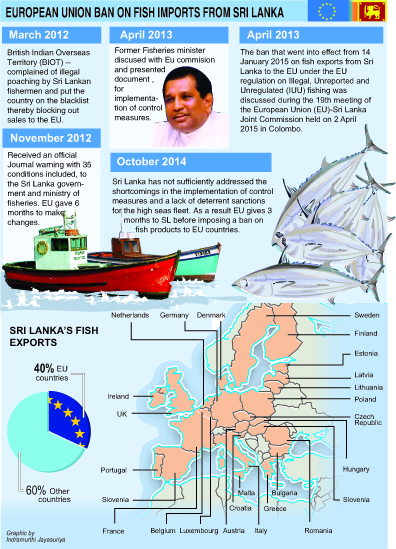News
Lanka frantic to win back billion-rupee EU catch
Sri Lanka is frantically fighting for time to get its house in order before the next visit of the European Commission scheduled in June to get back its share of fish exports to the European Union (EU) market.
It is planning to fix 1,500 multi-duty boats with the vessel monitoring system (VMS), a requirement by the EU to lift the ban on export of fish to the Union.
VMS is used to monitor a vessel on the high seas. Vessels fitted with VMS emit signals that indicate their location.
Fisheries Department Director General M.C.L. Fernando said all efforts were being made to fit VMS to around 1,500 multi-day boats registered with the department.
The department says there are around 2500 multi-day boats engaged in the fishing trade but that about 1,000 of them are small and do not need VMS as they are unable to stray into deep waters.
The VMS are to be distributed free of charge. According to the department, each VMS costs Rs. 375,000, a sum the poor fishermen cannot afford.
Last October, fishermen held a demonstration outside the Fisheries Ministry, refusing to fit their boats with VMS because the equipment was too expensive.
Following this, the government decided to distribute and install VMS free of charge. This will cost the government around Rs. 562 million.
The government is planning to use some funds from the Rs. 4260m allocation set aside to provide subsidised fishing gear, tackle and nets for fishermen.
According to the Fisheries Ministry there are about 28,000 motorised boats operating in Sri Lankan territorial waters qualified to receive the subsidy.
The ban on the export of fresh and chilled tuna and swordfish to the EU came into effect in January. Since then, Sri Lanka has been losing millions of dollars in foreign exchange.
The ban came up for review during the European Union-Sri Lanka Joint Commission meeting held on April 2 but the EU decided to continue with it on the grounds that Sri Lanka had not done enough to address illegal, unregulated and unreported (IUU) fishing in the international waters of the Indian Ocean.
The decision of the EU Commission, confirmed in a press release dated April 21, states Sri Lanka remains at Red Card status for not following up on reforms recommended by the EU to tackle illegal fishing.
The EU argues that IUU fishing occurs when the fishermen have no knowledge of their whereabouts in the sea and that a VMS fitted in boats would stop them from straying into international waters..
According to the EU around 26 million tonnes (15 per cent) of the catch, estimated to the value of 9 billion euros is caught illegally every year by countries exporting fish to the EU. This includes Thailand, Belize, Guinea and Sri Lanka.
Sri Lanka is the second biggest exporter to the EU. In 2013 it exported fish to the value of 74 million euro.
Sri Lanka got its yellow card, a warning, in November 2012 but fisheries authorities paid no heed. Subsequently a red card was issued in January this year, banning Sri Lanka from exporting fish to the EU.
The country was placed on three months’ notice to tackle problems related to IUU fishing but is struggling to conform to the reforms imposed by the EU.
The department is able to fit only 50 VMS in a month. With 1,500 boats that need VMS it would take at least another 30 months to complete the task.
Political circles said the change in the political arena also contributed to the delay in handling the matter expeditiously.
It is believed that former fisheries minister Rajitha Senaratne, who was conversant with the issue, had arranged for VMS to be fitted to large multi-day boats but was transferred to another ministry in the new government that came to power in early January.
The department’s Director-General, Mr. Fernando, said the ministry now faced a major task including the construction of a building to house the satellite equipment that monitors the VMS system.
“In addition, we have to carry out several awareness programmes to educate the fishermen,” he said.

